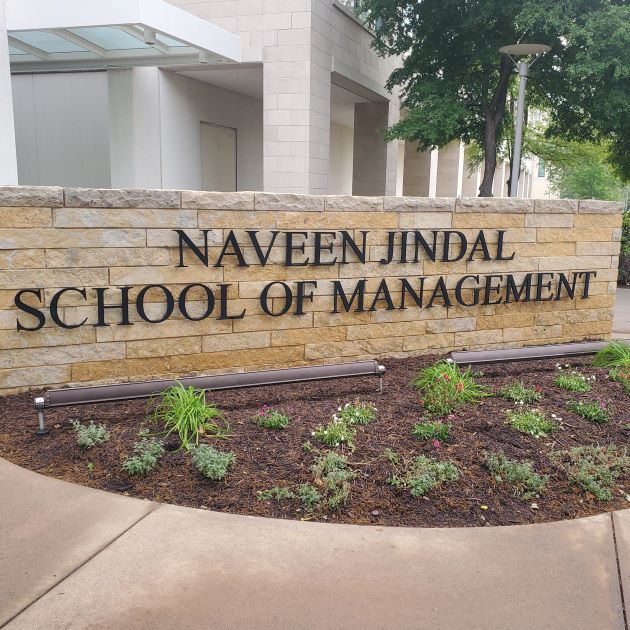
Fast-track is not just a colorful term for accelerating a process toward a particular goal or milestone; it is a structured pathway at the Naveen Jindal School of Management, one that is designed to help ambitious undergraduate students shorten the time and reduce the cost needed to earn a master’s degree.
The Jindal School will present a Fast-Track Event Nov. 12, aimed at qualified undergraduate students who are interested in learning how to earn up to 12 graduate credit hours that can apply toward a master’s degree while they are still completing their undergraduate studies. Each graduate program will be represented and program directors will be available to discuss program specifics.

“Fast-track is one of the best ways for our undergraduate students who are thinking of a graduate degree to use their time, money and their credits specifically toward a graduate program,” said Dr. Gaurav Shekhar, an assistant professor of instruction in the Jindal School’s Information Systems Area and senior assistant dean for graduate programs and graduate student experience. “It’s also a good way for them to test if this is something that they want to do.”
Fast-tracking provides students with up to $10,000 in potential cost savings as compared with students who take the traditional route to graduate school. The estimated wage gap for someone with a master’s degree in information technology and management versus their counterpart with only a bachelor’s degree is about 15-20%, Shekhar said.
“Fast-track is like a preview into graduate school but one that counts toward your bachelor’s degree,” Shekhar said. “Not only that but also knocking out up to 12 hours of graduate studies leaves you with only 24 credit hours to complete once you begin graduate school. Those remaining 24 credit hours can be completed in a single year.”
Shekhar said that employers who learn that the prospective employee took graduate courses while still an undergraduate student understand that the person is not afraid to get out of their comfort zone.

Dr. Dawn Owens, a clinical associate professor in the Information Systems Area and associate dean for undergraduate programs at the Jindal School, related a story about an undergraduate student who was having a hard time with his job search after the COVID-19 pandemic.
“He did not mention his graduate program work,” she said. “However, he updated his résumé to indicate that he was taking graduate-level courses and that made all the difference — he started receiving calls for interviews.”
Shekhar added that even if fast-track students never start their graduate program, they still have more advanced knowledge when they begin their careers.
“Graduate courses are tougher and have more complexities than the corresponding undergraduate courses,” he said. “We are well known for our technical rigor here at The University of Texas at Dallas and the Jindal School. Employers who are aware of that rigor don’t take it lightly.”
Fast-track students also bypass GRE or GMAT requirements for acceptance into a graduate program at the Jindal School, even if they delay starting their graduate program for up to one year, Shekhar said.
“They don’t need a separate application,” he said. “Fast-track is like a bridge from undergraduate to graduate school.”
Yet another benefit to fast-tracking, Shekhar said, is that graduate courses help build on the foundation of an undergraduate education by further expanding critical thinking and deepening cognitive skills.
Finally, fast-track students are networking with graduate students who just happen to be their classmates.
“I always say that your network is your net worth,” Shekhar said. “The graduate students with whom fast-track students interact come from all over the world. You are expanding your network well beyond what you can do as an undergraduate student who did not fast-track.
Owens said that when students ask her why they should consider fast-track, her answer is usually “why not?” adding that it is a unique opportunity that every undergraduate should explore.
“It’s truly a win-win,” she said. “Admission is straightforward, there’s no additional tuition cost, and there’s no commitment required. If students decide not to pursue a graduate degree, there’s no downside — they haven’t lost a thing. But if they later decide to go for a graduate degree, they’ll have missed out on a valuable head start and the chance to complete some of those requirements early. It’s an easy choice with long-term benefits and flexibility built in.”

Dr. Mark Thouin, a clinical professor in the Information Systems Area at the Jindal School and associate dean for graduate programs – academic operations, emphasized the fast-track program’s practical benefits.
“It provides a straightforward, easy way for undergraduate students to save time and money in their pursuit of a specialized master’s degree or an MBA,” he said. “It further enhances JSOM’s reputation for providing students with an excellent return on investment.”
What: JSOM Fast-Track Event
When: Tuesday, Nov. 12, 11:30 a.m.-1 p.m.
Where: Davidson Auditorium (JSOM 1.118)
Link to Event Page: https://jindal.utdallas.edu/calendar/47942756101912&instance=47942756102937





